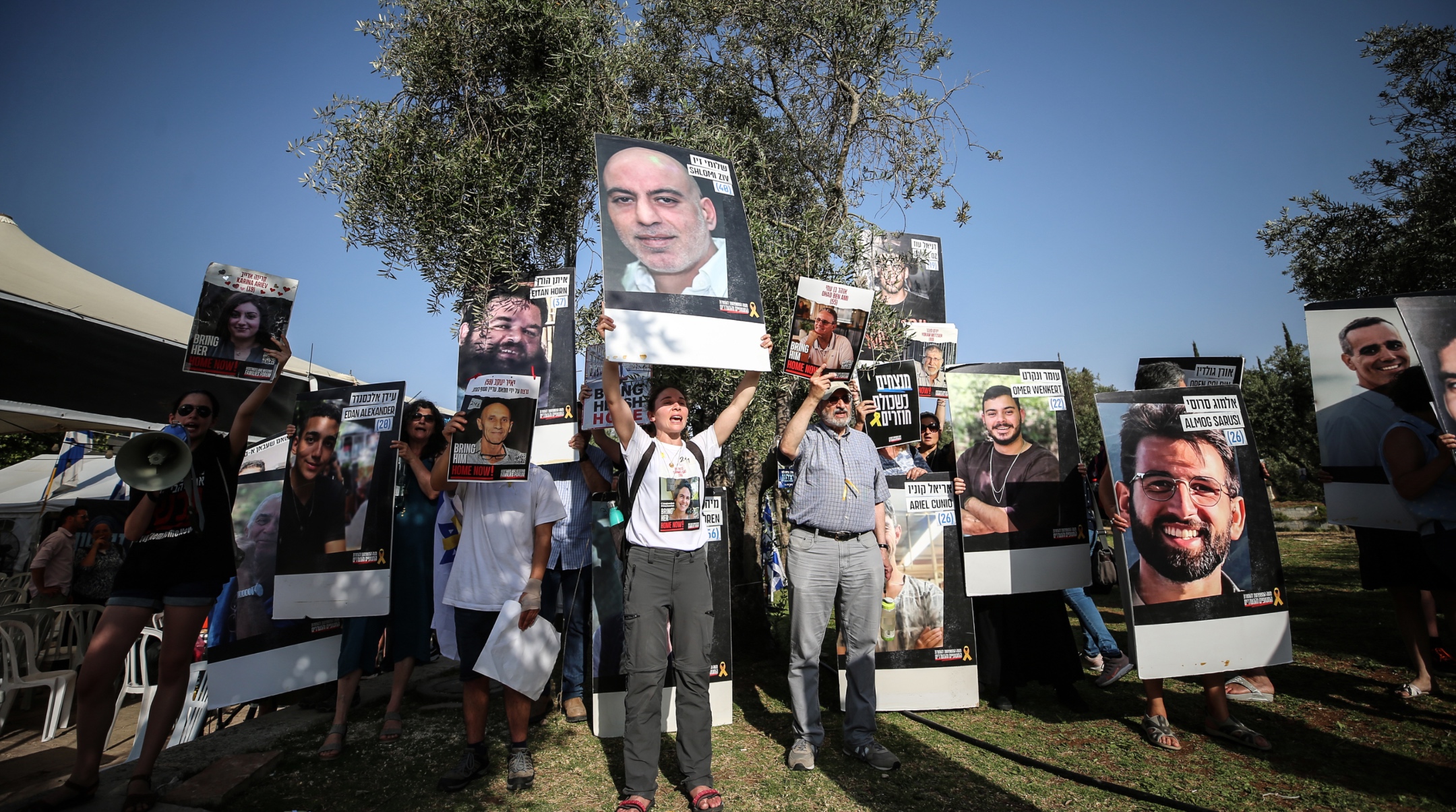4 more hostages held in Gaza are dead, Israeli army announces
The army said it would seek to understand the circumstances of the men’s deaths months after being taken hostage

Relatives and friends of Israelis held hostage by Hamas militants in Gaza gather for a rally in the center of Jerusalem on June 3, 2024. Photo by Saeed Qaq/NurPhoto via Getty Images
Four more male hostages held in Gaza since Oct. 7 are believed to be dead, according to an announcement Monday by the Israeli army that drew an immediate plea by a group representing the family members of the dozens of remaining hostages to make a deal for their release.
The army on Monday named the hostages as Chaim Peri, Yoram Metzger, Amiram Cooper and Nadav Popplewell and said that Hamas was holding their bodies. The army also announced on Monday that a man who had been thought to be a hostage, Dolev Yehud, had in fact been killed on Oct. 7.
The revelations mean that more than a third of the 120 hostages thought to remain in Gaza are known to be dead.
The army said it was able to determine that the four men had died despite not being able to retrieve their bodies.
“The decision to pronounce the four hostages dead was based on intelligence and was confirmed by a Ministry of Health expert committee, in coordination with the Ministry of Religious Services and the Chief Rabbi of Israel,” it said in an announcement. “The circumstances of their death in Hamas captivity are still under examination by all the relevant professionals.”
The four men who had been taken alive to Gaza had appeared in hostage videos, although Hamas said when it released a video of Popplewell in May that he had been killed in an Israeli airstrike since it was filmed.
Israeli officials said they believed the four men had died several months ago in Khan Younis while the army was operating there. Several other hostages have been killed during failed rescue operations, while the causes of death for some found died in Gaza remain unknown.
“I know that difficult questions will arise regarding the circumstances of the deaths,” Daniel Hagari, an IDF spokesman, said during a press conference. “We are examining the circumstances of death in depth, looking into all possibilities, and we will present the findings as soon as possible.”
The Hostages Family Forum, which represents the families who have joined in protests urging the government of Israeli prime Minister Benjamin Netanyahu to reach a ceasefire deal with Hamas, said the news of their deaths “should shake every citizen in the State of Israel and lead every leader to profound soul-searching.”
It called on the Israeli government to approve a deal that U.S. President Joe Biden said last week was an initiative of Netanyahu’s, and which would establish a temporary ceasefire and release elderly, wounded and child hostages immediately in exchange for hundreds of Palestinians detained by Israel.
“The Israeli government must send out a negotiating delegation this evening and return all 124 hostages, both living and murdered, to their homes,” its statement said. “It is time to end this cycle of sacrifice and neglect. Their murder in captivity is a mark of disgrace and a sad reflection on the significance of delaying previous deals. We reiterate our demand to the Israeli government: approve the Netanyahu deal immediately!”
Netanyahu has not publicly acknowledged ownership of the deal, although Israeli officials have told Israeli media that parts of it comport to a version his government submitted weeks ago, while saying there remain significant gaps. Far-right parties have threatened to bolt the coalition if he agrees to the deal, which requires Israel to pull out of major population centers in Gaza. The army is currently seeking to rout Hamas from Rafah, a town on the Gaza-Egypt border.
Cooper, 84, Metzger, 80, and Peri, 80, were all from Kibbutz Nir Oz, and Popplewell, a dual British-Israeli citizen, was from Kibbutz Nirim. Both kibbutzes suffered heavy losses on Oct. 7 when Hamas terrorists killed over 1,200 people and abducted more than 250, launching the current war.
Popplewell’s mother, Channa Peri, was released during a temporary ceasefire in November, as was Cooper’s wife, Nurit, and Metzger’s wife, Tamar.
On Oct. 7, Peri hid his wife in the safe room and went out to fight the invading terrorists, deflecting attention from his wife, who was not harmed; the family later learned that he had been abducted alive by a woman from Nir Oz who was released several days later.
“My grandpa sacrificed his freedom to save his wife,” his grandson, Mai Albini-Peri, said before Passover, noting that Peri, whose 80th birthday had just passed, was a peace activist who drove sick children from Gaza to Israeli hospitals. “He dedicated his life to liberating oppressed people wherever,” Albini-Peri said.
This article originally appeared on JTA.org.
A message from our CEO & publisher Rachel Fishman Feddersen
I hope you appreciated this article. Before you go, I’d like to ask you to please support the Forward’s award-winning, nonprofit journalism during this critical time.
We’ve set a goal to raise $260,000 by December 31. That’s an ambitious goal, but one that will give us the resources we need to invest in the high quality news, opinion, analysis and cultural coverage that isn’t available anywhere else.
If you feel inspired to make an impact, now is the time to give something back. Join us as a member at your most generous level.
— Rachel Fishman Feddersen, Publisher and CEO